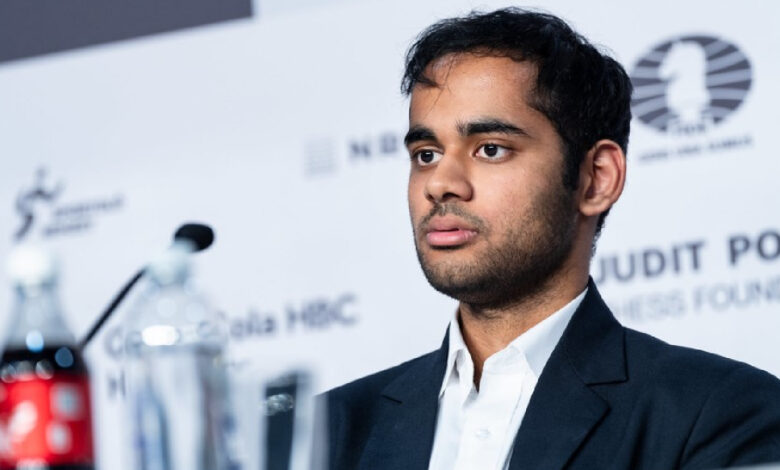Arjun Erigaisi’s mother reveals tales from his childhood: Was 3 when a teacher said he’d do well in chess; was calmed the sport | Chess News

Arjun Erigaisi was around three years old when his pre-kindergarten teacher first advised his parents that chess would be a good fit for him. The story goes that the young Arjun could recite multiplication tables in reverse and remembered the capitals of around 70 countries along with their currencies.It was only four years later — at the age of seven — when Arjun was finally introduced to the sport in which he’s currently the world’s fourth ranked player.
“This incident was back when we were living in Tirupathi. That teacher, Vidhya ma’am, told us that he has great grasping power and he can play chess really well. But in those days there were not too many options to learn chess in Tirupathi,” Arjun’s mother Jyothi tells The Indian Express a few hours after her son has confirmed his individual gold medal on the third board at the Chess Olympiad which also helped the Indian team win a gold medal in the open section and the overall gold.
We are the Champions 🥇🇮🇳🥇 https://t.co/pvA72ioyUB
— Arjun Erigaisi (@ArjunErigaisi) September 23, 2024
His mother paints a portrait of a young Arjun as a boy who was an ‘aggressive’ personality, but also someone every teacher loved. In a sense, as a child, Arjun was exactly like the mythological Pandava prince he was named after: focussed on excellence and always wanting to be the best.
“When he was small, we put him in multiple summer camps: skating, swimming, music, dance. Whatever he took up, he took up very seriously. He’d work with full passion. His seriousness has been there since childhood. Just like any other kid, he used to be a naughty child when he was small. Arjun was an aggressive personality. When they used to go out, we would be a little afraid of what he would do out there.
“But when he was introduced to chess, everything else was sidelined in his life. He was so focused on chess, that all of his aggression and the seriousness was channelised into chess. He suddenly became very calm,” recounts Jyothi.
That intense focus saw Arjun become a grandmaster at the age of 14 years and 11 months, just seven years after he first started learning the sport.
On the chess board, Arjun’s play creates a tempest of chaos, the reason why Magnus Carlsen admiringly called him a ‘mad man on the chess board’. He plays an aggressive brand of chess, chasing nothing else but victory, even if he has to grind it out for hours on the board and take risks that can make jaws drop. That drive to succeed comes from a desire to prove himself and be the best, a trait he had even as a kid when there was not too much on the line, except praise from teachers.
“When he was in school, especially in Tirupathi, the teachers loved him. Whatever homework assignment was given to kids, he used to try and complete it quickly. Teachers were very fond of him. He also used to narrate tales about Ramayana and Eklavya early on. He would not mingle much with the rest of the kids. In fact, he would complain to the teachers that are making a ruckus and dracting him and preventing him from doing his work,” chuckles Jyothi.
His parents noticed Arjun’s competitive streak very early on.
“He’s always been a hard worker. Very competitive right from his childhood. In his school they would support art and extra-curricular activities. Everyday he would make a new piece of paper art, which he would ensure was good enough to get displayed for the others to see. The norm was that the best pieces of art would get displayed. He was always so competitive that he wanted only his art to be displayed. Back in those days, on the badminton courts in our building you would have all ages playing together. He would want to be better than the rest, no matter the age gap,” says Jyothi.
Another trait that the young Arjun showed from very early on was that he was earnest to a fault.
One of Jyothi’s favourite tales from Arjun’s childhood is how in the Warangal days, Arjun’s school started a drive to help an old-age home and dispatched kids to collect donations. Arjun and his ser Keerthana were so moved that cause that they went above and beyond. Soon they had enled outsiders — complete strangers — to collect money on their behalf as well for the old-age home. They ended up collecting the highest amount in the whole school.
His mother recounts with a chuckle how Arjun was the reason why the tiffin rules at his school were changed. The story she tells is that because he would happily take healthy items like fruits and home-cooked food everyday as compared to others who would bring junk food, the teachers had to implement a rule that kids could only bring wafers and biscuits once a week.
‘Look at Arjun,’ became a common refrain in his school days, says Jyothi.
These days, not just his school, the rest of the world is saying that phrase aloud.



